NSG 210
West Kentucky Community And Technical College
Page 2 out of 39 results
Sort by
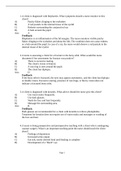
-
Chapter 42, Caring for Clients With Eye Disorders
- Exam (elaborations) • 10 pages • 2022
-
- $8.49
- + learn more
1.A client is diagnosed with blepharitis. What symptoms should a nurse monitor in this client? A) Patchy flakes clinging to the eyelashes B) A red pustule in the internal tissue of the eyelid C) Redness surrounding the conjunctival sac D) A halo around the pupil Ans: A Feedback: Blepharitis is an inflammation of the lid margins. The nurse monitors visible patchy flakes clinging to the eyelashes and about the lids. The condition does not cause redness or a halo around the pupil. In case...
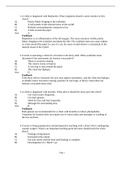
-
Chapter 42, Caring for Clients With Eye Disorders
- Exam (elaborations) • 10 pages • 2022
-
- $8.49
- + learn more
1.A client is diagnosed with blepharitis. What symptoms should a nurse monitor in this client? A) Patchy flakes clinging to the eyelashes B) A red pustule in the internal tissue of the eyelid C) Redness surrounding the conjunctival sac D) A halo around the pupil Ans: A Feedback: Blepharitis is an inflammation of the lid margins. The nurse monitors visible patchy flakes clinging to the eyelashes and about the lids. The condition does not cause redness or a halo around the pupil. In case...
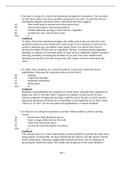
-
Chapter 37, Caring for Clients With Central and Periphera
- Exam (elaborations) • 12 pages • 2022
-
- $8.49
- + learn more
1.The nurse is caring for a client with trigeminal neuralgia (tic douloureux). The care plan for this client reflects the client's problem eating due to jaw pain. To assist the client in meeting the adequate nutritional needs, what should the nurse suggest? A) Take small meals of nutrient and calorie-dense food. B) Increase the intake of calcium and proteins. C) Include additional servings of fruits and raw vegetables. D) Include fish, liver, and chicken in diet. Ans: A Feedback: To he...
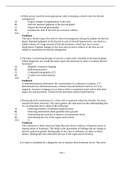
-
Chapter 49, Introduction to the Endocrine System
- Exam (elaborations) • 11 pages • 2022
-
- $8.49
- + learn more
1.Which action would be most appropriate when evaluating a client's neck for thyroid enlargement? A) Inspect changes in pigmentation in the neck. B) Perform repeated palpation of the thyroid gland. C) Palpate the thyroid gland gently. D) Examine the skin of the neck for excessive oiliness. Ans: C Feedback: The nurse should inspect the neck for thyroid enlargement and gently palpate the thyroid gland. Repeated palpation of the thyroid in case of thyroid hyperactivity can result in a su...
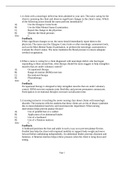
-
Chapter 40, Caring for Clients With Neurologic Deficits. complete Q&A_2022.
- Exam (elaborations) • 13 pages • 2022
-
- $8.49
- + learn more
1.A client with a neurologic deficit has been admitted to your unit. The nurse caring for the client is assessing the client and observes significant changes in the client's status. Which of the following action should the nurse perform immediately? A) Use the Glasgow Coma Scale. B) Use the Mini-Mental Status Examination. C) Report the change to the physician. D) Monitor the blood pressure. Ans: C Feedback: When significant changes occur, the nurse should immediately report them to the...
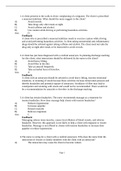
-
Chapter 38, Caring for Clients With Cerebrovascular Disorders
- Exam (elaborations) • 12 pages • 2022
-
- $9.49
- + learn more
1.A client presents to the walk-in clinic complaining of a migraine. The client is prescribed a neuronal stabilizer. What should the nurse suggest to the client? A) Avoid crowds. B) Take drugs only after meals at night. C) Avoid caffeine and alcohol. D) Use caution while driving or performing hazardous activities. Ans: D Feedback: A client who is prescribed a neuronal stabilizer needs to exercise caution while driving and avoid performing hazardous activities. A client taking nonsteroid...
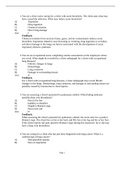
-
Chapter 21, Caring for Clients With Lower Respiratory Disorders
- Exam (elaborations) • 12 pages • 2022
-
- $9.49
- + learn more
1.You are a clinic nurse caring for a client with acute bronchitis. The client asks what may have caused the infection. What may induce acute bronchitis? A) Aspiration B) Drug ingestion C) Chemical irritation D) Direct lung damage Ans: C Feedback: Chemical irritation from noxious fumes, gases, and air contaminants induces acute bronchitis. Aspiration related to near drowning or vomiting, drug ingestion or overdose, and direct damage to the lungs are factors associated with the developm...
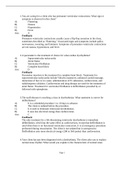
-
Chapter 26, Caring for Clients With Cardiac Dysrhythmias.
- Exam (elaborations) • 12 pages • 2022
-
- $9.49
- + learn more
1.You are caring for a client who has premature ventricular contractions. What sign or symptom is observed in this client? A) Fluttering B) Nausea C) Hypotension D) Fever Ans: A Feedback: Premature ventricular contractions usually cause a flip-flop sensation in the chest, sometimes described as “fluttering.” Associated signs and symptoms include pallor, nervousness, sweating, and faintness. Symptoms of premature ventricular contractions are not nausea, hypotension, and fever. 2.A...
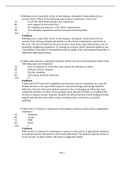
-
Chapter 68, Caring for Clients With Anxiety Disorders.
- Exam (elaborations) • 12 pages • 2022
-
- $10.49
- + learn more
1.Building trust is especially critical to developing a therapeutic relationship with an anxious client. Which of the following interventions contributes to this trust? A) Leave the client alone during a new experience. B) Give support in nonverbal ways. C) Be available and attentive to the client's requirements. D) Give detailed explanations and do not repeat them frequently. Ans: C Feedback: Building trust is especially critical to developing a therapeutic relationship with an anxiou...
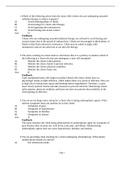
-
Chapter 18, Caring for Clients With Cancer
- Exam (elaborations) • 15 pages • 2022
-
- $8.49
- + learn more
1.Which of the following advice does the nurse offer clients who are undergoing unsealed radiation therapy to reduce exposure? A) Avoid drinking plenty of fluids. B) Avoid eating for 3 hours after therapy. C) Avoid applying skin moisturizers. D) Avoid kissing and sexual contact. Ans: D Feedback: Clients who are undergoing unsealed radiation therapy are advised to avoid kissing and sexual contact due to the spread of radioactivity. Clients are encouraged to drink plenty of fluids to hel...

How did he do that? By selling his study resources on Stuvia. Try it yourself! Discover all about earning on Stuvia


